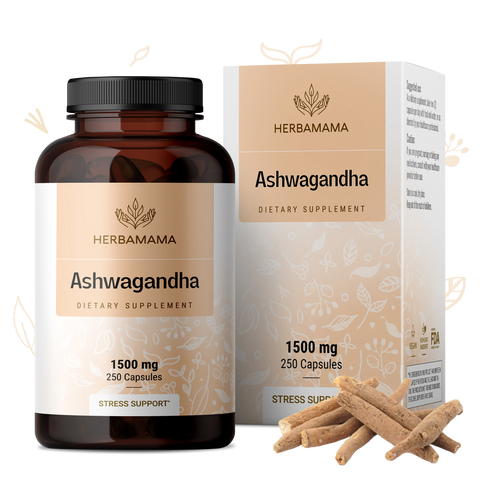What is ashwagandha extract?
Ashwagandha, a powerful and ancient herb, has been used for centuries for sleep support, anxiety and stress relief. However, its benefits extend far beyond these well-known effects, as research has demonstrated its anti-cancer, anti-diabetic, cardio-protective, and neuroprotective properties. This remarkable herb, derived from the ashwagandha root extract, has been a vital component in traditional Ayurvedic medicine and continues to gain popularity in modern times due to its numerous health benefits. In this article, we will delve into the rich history of ashwagandha and the ashwagandha supplements benefits backed by scientific research.
To learn more about ashwagandha extract benefits, we invite you to watch the informative video on our Herbamama YouTube channel!
Ashwagandha Herb and its Anticancer Activity
Cancer remains the second leading cause of death globally, with an increasing number of people at risk of cancer each year. One method to combating this issue involves an integrative approach, which combines conventional and alternative medicine to reduce secondary cancers, boost the immune system, and alleviate the adverse effects of chemotherapy and radiation. Ashwagandha is a natural herb that has shown potential in such areas.
In 1961, ashwagandha leaves were found to have chemotherapeutic potential. Since then, numerous studies have shown that this herb can interfere with cancer in several ways. Ashwagandha increases autophagy, apoptosis, and cell cycle arrest, all of which contribute to halting cancer growth and multiplication. Additionally, its anti-inflammatory effects help combat inflammation, a known hallmark of cancer.
Ashwagandha's chemical compounds, such as fanulids, are partially responsible for its anti-cancer properties. Fanulid A, also known as Witherin A, has been extensively researched and found to increase apoptosis, anti-tumor proteins, and decrease signaling pathways in cancer cells. This molecule has been combined with certain chemotherapy drugs, such as oxlopatin, to enhance its effects on pancreatic cancer in animals.
The herb's immunomodulatory properties boost the immune system, increasing white blood cells, platelets, and antibodies. Ashwagandha also supports the spleen and thymus, which play essential roles in immune function.
However, it's important to consult with healthcare providers before using ashwagandha, especially if undergoing chemotherapy or taking immunosuppressant drugs. Early research suggests that ashwagandha may help minimize the side effects of chemotherapy and radiation, but more studies are needed.
Ashwagandha's Potential as an Anti-Diabetic Agent
The benefits of ashwagandha extract include its potential to combat diabetes. The anti-diabetic effects of ashwagandha primarily involve its ability to reduce blood glucose levels, decrease insulin, and lower hemoglobin A1c levels, which are key markers for blood sugar control.
Research indicates that ashwagandha can improve insulin sensitivity, which is crucial for those with type 2 diabetes. In a study conducted on diabetic rats, administering ashwagandha for 30 days resulted in stabilized blood sugar levels without any adverse effects.
Interestingly, the leaves of the ashwagandha plant have been found to be more effective than the root in regulating blood sugar levels. Studies have shown that the leaf can increase glucose uptake in cells by 54%, thanks to a chemical called withanolide, the same compound known to possess anti-cancer properties. This compound also has blood sugar balancing properties, which makes it even more appealing as a natural remedy for diabetes.
In another study, researchers administered withanolide concentrate to rats that had received pancreas transplants. The results showed a significant reduction in inflammation within the pancreas. This demonstrates the potential of ashwagandha and its components to manage diabetes-related complications. As more research continues to explore the benefits of ashwagandha, it becomes increasingly clear that this ancient herb may provide a promising, natural approach to diabetes management.
Ashwagandha Herb Anti-Aging Properties
In Ayurvedic medicine, ashwagandha is highly regarded for its potential anti-aging and disease-fighting properties. It is ranked at the top of the list in the branch of rasayana, which focuses on supporting the body in resisting diseases, increasing intellect, strength, and delaying aging. Adding ashwagandha powder to your morning routine can help stabilize blood glucose levels and support overall health.
Protecting Your Brain: The Neuroprotective Properties of Ashwagandha
Ashwagandha is a powerful adaptogenic herb that has gained attention for its potential neuroprotective properties, which can be beneficial for various neurodegenerative conditions such as Alzheimer's, ALS, Huntington's disease, and Parkinson's. The understanding of these effects on the central nervous system began in the 1960s when scientists first noticed their impact.
Before delving into the benefits offered by ashwagandha, it is essential to understand some basics about the nervous system anatomy. The nervous system is responsible for movement, thought, and emotions. It has billions of nerves, each with three components: the cell body (or soma), which interprets information and maintains neuron function; the axon, which transmits information from the cell body to nerve endings; and the dendrites, which receive information from other nerves and relay it to the cell body.
The neuroprotective properties of ashwagandha are primarily attributed to its withanolides, a family of compounds found in the plant. In the context of Alzheimer's disease, a neurodegenerative condition affecting 36 million people globally, withanolides also minimize the accumulation of amyloid plaques, which are waste products and pathological hallmarks of Alzheimer's. Although these are early studies, the results are promising for those suffering from the disease.
Parkinson's disease is another neurodegenerative condition that involves the destruction of dopamine-producing neurons in the brain, leading to symptoms such as tremors, stiffness, and slow movement. Research has shown that when rats with Parkinson's consumed ashwagandha, there was an increase in dopamine levels, dopamine D2 receptors, and a reduction in inflammation. Additionally, the rats' movement was restored, and antioxidant enzymes, such as catalase, were increased. This enzyme helps revive tyrosine hydroxylase, a marker used by scientists to measure the concentration of dopamine neurons.
Although ashwagandha root extract's benefits in Huntington's disease and ALS are limited, research has shown some anti-inflammatory effects and modest improvements in movement for both humans and rats with Huntington's.
In summary, ashwagandha has demonstrated significant potential for supporting the nervous system and strengthening nerves, making it an excellent addition to a daily dietary regimen for maintaining nerve health. Its neuroprotective properties offer hope for those affected by various neurodegenerative conditions, and as more research is conducted, we may continue to discover even more benefits of this remarkable herb.
Ashwagandha for Anxiety and Stress Relief
Ashwagandha is a renowned adaptogenic herb known for its stress-relieving and calming effects. Many individuals have used ashwagandha for stress and mood.
Ashwagandha has been shown to help reduce cortisol levels, improving mental and physical faculties. Its benefits extend to various conditions, such as PTSD, ADHD, schizophrenia, and anxiety. In one study, 75 adults took 300 milligrams of ashwagandha twice a day for eight weeks while practicing other relaxation techniques like yoga. The participants reported a 56.5% increase in social function, vitality, concentration, and mental health. Thus, some use ashwagandha for anxiety. One of the great advantages of ashwagandha is that its effects can persist even after discontinuing use.
If you decide to try ashwagandha in powder form, be prepared for its strong odor, which is often described as "horse-like." The taste may not be pleasant, but the benefits are worth it. If you prefer to avoid the taste, consider taking ashwagandha in capsule or tincture form, which can be easily mixed with water.
In conclusion, ashwagandha is a powerful herb for managing stress and anxiety, making it an excellent addition to anyone's daily routine. Because of its effects on stress, you may consider using ashwagandha for sleep as well. With its wide range of benefits and lasting effects, ashwagandha has the potential to significantly improve mental and emotional well-being, especially in today's stressful world.
Summary
In conclusion, ashwagandha is a versatile and potent herb with numerous health benefits, such as anti-diabetic effects, neuroprotective properties, and anxiety and stress relief. Its ability to lower blood glucose levels, protect the nervous system, and alleviate stress make it an ideal natural remedy for various ailments. Incorporating ashwagandha into your daily routine can lead to improved overall health and well-being. Others use ashwagandha for weight loss or ashwagandha for adrenal support. As research on this powerful herb continues, we can expect to discover even more potential benefits and applications for this remarkable plant.
Take Action Today!
Don't wait any longer to experience the incredible benefits of ashwagandha supplements. Visit our website now to order ashwagandha capsules, and organic ashwagandha extract. Start your journey towards improved health and well-being today by adding this powerful herb to your daily routine.





